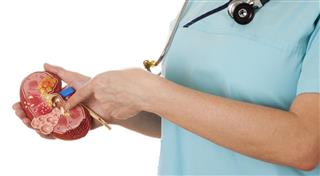
While kidney stones is a common problem affecting both men and women, it is observed that men are four times more likely to develop these small, hardened crystals in the kidneys. Here is a list of the causes, symptoms and treatment of kidney stones in men.
One of the most painful, and unfortunately the most common disorders affecting men, is the presence of kidney stones. Although they do affect women as well, men are more vulnerable to kidney stones than women. For all those men who only partially know about it, and for those completely unaware of this painful condition, here is a rundown on what the condition is, what are the causes of kidney stones, and what are the symptoms and treatment measures for the same.
What are Kidney Stones?
Formed within the kidney or the urinary tract, kidney stones are hard, crystalline mineral deposits in the form of small stone like structures. This condition is also known as nephronlithiasis (nephron = related to kidney, lithos = stone). It is one of the most common disorders of the urinary tract, affecting nearly 10% of Americans at some point in their lives. While typically all adults over the age of 30 are at risk, men tend to be affected more frequently than women; especially men in their 40s. To understand how these stones are formed in our body, we have to understand the basic working of the urinary tract.
Formation of Kidney Stones
The kidneys are bean-shaped organs located below the ribs. The main function of these organs is to remove extra water and wastes from the blood, producing urine. Kidneys also help keep a stable balance of salts and other solutes in the blood. While most of the stones are passed out of the body in the urine stream, the stones which are sufficiently larger in size can cause obstruction to the ureter thus causing extreme pain.
Stones or crystals are the result of certain chemicals in the kidneys, forming crystals and bonding together. Although there are many chemical compounds that can form stones in the urinary tract, the most common type of kidney stones in men contains calcium with oxalate or phosphate and uric acid.
Causes of Kidney Stones in Men
There are many causes of kidney stones; most common among these is a urinary tract infection. Certain medication is also known to cause renal stones in men. Some aspects of a person’s lifestyle habits, such as drinking less water, lack of physical activity (exercise) over long periods, and consuming excess of calcium oxalate (found in milk, tea and chocolate) can all contribute to this renal problem. Finally, genetics also predispose certain individuals to kidney stones, especially if there is a family history.
The reason why men have more kidney stones than women is because of larger muscle mass as compared to women. Daily breakdown of the tissue results in increased metabolic waste and a predisposition to stone formation. The other leading cause is a complicated urinary tract, as compared to those of females. The prostate gland in men enlarges with age, leading o a condition known as benign prostate hypertrophy; it can result in difficulty in emptying the bladder. With the obstruction of the bladder outflow, chemicals and toxins supposed to be thrown out of the body instead go on accumulating in the bladder, forming crystals and stones. The structure of penile urethra caused due to gonorrhea infection, catheterization, penile trauma may also further minimize bladder outflow and contribute to the formation of crystals.
Symptoms of Kidney Stones in Men
Specific Symptoms:
- Intense pain, especially while urinating
- Spasms affecting one or both sides of the back
- Pain in abdomen and genitals
Other Symptoms:
- Nausea
- Fever and chills
- Blood in urine
There may be several other symptoms of renal stones as well. Recurring urinary tract infections are another common symptom. Along with that, men suffering from kidney stones frequently feel the need to urinate. As for the urine, it presents such characteristics as a foul smell, and cloudy or red tinged color.
Treatment for Kidney Stones
Based on the size and type of the stone, treatment options may vary. Adequate hydration and exercise can help to dissolve the smaller stones (less than quarter of an inch), so that they are passed off naturally. However, the bigger stones that do not pass off naturally may have to be treated. The most common treatment is extracorporeal shock wave lithotripsy (ESWL). In this method, the kidney stones are located using X-rays or ultrasound, and shock waves are passed to break the stones into smaller particles; once broken down to smaller sizes, the stones can be passed off naturally. Sometimes, a surgical removal of stones may be necessary, a procedure known as percutaneous nephrolithotomy.
The best way to get rid of renal stones is to adopt a lifestyle that prevents the formation of kidney stones. Drink plenty of water, especially after exercising and rigorous physical activity. Along with this, if you are prone to calcium oxalate stones, avoid consuming food rich in calcium such as, milk and chocolates. If you are prone to uric acid stones, then avoid foods that are high in protein, such as meat.
However, milk and meat have a lot of other nutritional benefits, so it may not be possible to entirely skip out on such foods. In that case, moderate the quantity in which you consume these foodstuffs. However, nothing substitutes the advice and care of a medical professional. Consult your doctor and physician if you plan on making any long-term changes, especially in your diet or exercise regime. Eat healthy, feel fine!




